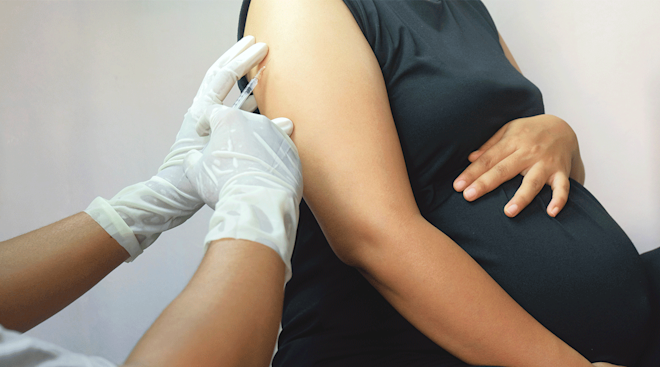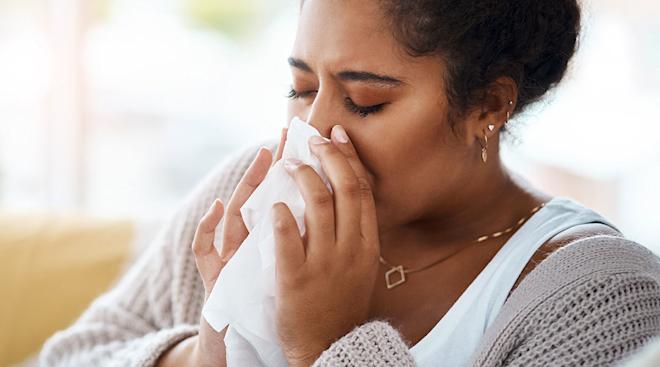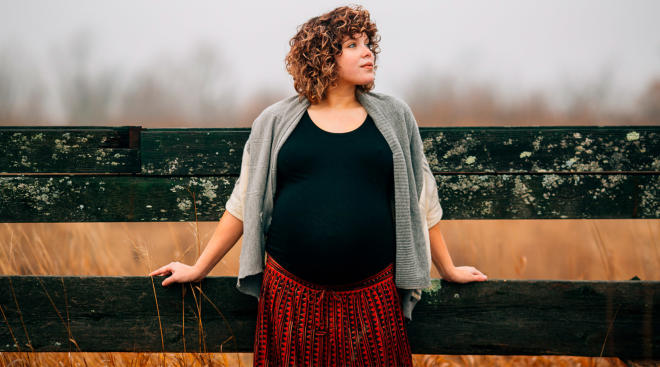The Flu Shot Is an Easy and Effective Way for Pregnant Women to Protect Themselves and Baby
A single word, “pregnancy,” sparks many thoughts and emotions. There’s an avalanche of needs, like diapers, a crib, a stroller, and baby clothes, just to name a few. It’s an exciting time, and feeling overwhelmed is normal. Baby’s health is top priority, but moms-to-be need to take care of themselves too. And by doing so, your baby benefits. One important step you should take is to get a flu shot while you are pregnant.
Research and Findings
A recent CDC co-authored study shows over the course of six flu seasons, getting a flu shot reduced a pregnant woman’s risk of being hospitalized with flu by an average of 40 percent. The study also found more than 8 in 10 pregnancies overlapped with flu season, showing how likely it is for pregnant women to be exposed to flu at some point during their pregnancies.
Another key finding from the survey: The flu shot was equally protective for women during all three trimesters. And it was just as protective for expecting women with underlying medical problems, like asthma and diabetes, as it was for otherwise healthy pregnant women. Previous studies show a flu shot can reduce a pregnant woman’s risk of flu illness.
The Flu and Pregnant Women
Getting the flu while pregnant can cause serious problems. Changes in the immune system, heart and lungs during pregnancy make you more likely to become severely ill from flu. Flu may also be harmful to your developing baby, which is why the best protection is vaccination. Pregnant women should get a flu shot, and not the live attenuated influenza vaccine (LAIV), also known as nasal spray flu vaccine.
Last flu season was horrible, with record-breaking levels of flu-like illness and hospitalization rates. CDC reported 183 flu-related deaths in children (through Oct. 6, 2018). Approximately 8 in every 10 of those deaths occurred in children who did not receive a flu vaccine. The flu shot in pregnant women can help protect babies in the first few months after birth, when they are too young to receive a flu vaccine.
Pregnant women who have flu symptoms—fever, cough, body aches, headache, etc.—should call their doctor, nurse or clinic right away, even if they have already had a flu shot. Doctors can prescribe flu antiviral drugs to treat flu, which can shorten illness, make it milder, and lessen the chance of developing serious complications.
Because pregnant women are at high risk of serious flu complications, CDC recommends they be treated quickly with antiviral drugs if they have flu symptoms. Fever is often a symptom of flu. Having a fever early in pregnancy increases the chances of having a baby with birth defects or other problems. Pregnant women with a fever can take Tylenol (or store brand equivalent) to reduce the fever, but they still need to keep their doctors or nurses informed about their illness.
Protecting Yourself and Baby
How does it work? Antibodies from a flu vaccine are passed from mother to developing baby, and help provide flu protection after birth. Children 6 months and older should get an annual flu vaccine each year. Children younger than 5 years old—especially those younger than 2 years old—are at high risk of serious flu-related complications like bronchitis, pneumonia, sinus infections and ear infections. Flu vaccination has important benefits: it can reduce flu illnesses, doctor visits, missed work and school days and prevent flu-related hospitalizations and deaths in children.
Flu shots have a good safety record, but first trimester data are limited. Millions of pregnant women have safely received flu vaccines over the past 50 years. CDC encourages pregnant women to talk to their doctors about getting a flu shot at any time during their pregnancies.
That said, it’s still important for women who deliver their babies before getting a flu shot to get vaccinated after delivery. Flu is spread from person to person, so it’s also imperative everyone who cares for babies gets a flu vaccine, including other household members, relatives and babysitters.
Pregnant women need flu shots to protect themselves and their babies. But, during the 2017-2018 flu season, only about 1 in 2 pregnant women in the US got a flu shot. There are many places to receive flu shots, including a healthcare provider’s office, at work or a pharmacy.
Remember, getting a flu shot is the most important step you can take to protect yourself and your baby from the flu.
Please note: The Bump and the materials and information it contains are not intended to, and do not constitute, medical or other health advice or diagnosis and should not be used as such. You should always consult with a qualified physician or health professional about your specific circumstances.
Navigate forward to interact with the calendar and select a date. Press the question mark key to get the keyboard shortcuts for changing dates.

















































